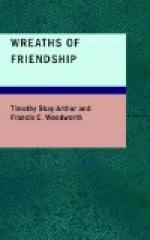“Yes, no doubt. But I want you to see exactly where his guilt lay. It was simply in his not yielding to his mother’s wish, when she so kindly left him at liberty to do as he chose; especially as he knew she was ill, and needed his assistance.”
“Charley deserved a good whipping.”
“Well, he was punished severely.”
“Did his mother punish him?”
“No, for weeks she was too ill for that; and if she had been well, probably she would not have punished him.”
“How did he get punished?”
“By his own conscience. He felt that he had done wrong, and that made him very unhappy. He saw, then, that he had been very unkind to his mother, and that his unkindness cost her pain and sorrow. He would rather have given all his playthings—every one of his toys—than to feel as he did then. Indeed, I think he would prefer the severest punishment from his mother, to the wound which his conscience inflicted. Do you understand now, my son, what is meant by conscience?”
“I think I do. When we are sorry for any thing we have done, it is the conscience that makes us feel so.”
“Not always. Charles was no doubt very sorry he had tried to cross the river on the tree, because he fell into the water, and came near being drowned. But the conscience had nothing to do with this sorrow. When we see that we have carelessly or wilfully injured some one—hurt his feelings, perhaps—or when we reflect that we have disobeyed God, and feel grieved and sorry on this account, then the conscience is the cause of our pain. So you see that it is one of the numerous proofs of the wisdom and the goodness of God, that he has given mankind a conscience. Take care, my son, that you listen to its voice.”
OLD NED.
Not many years ago, Farmer Jones had an old horse named “Ned,” who appeared to have almost as much sense as some people. Ned was a favorite with his master, who petted him as if he were a child instead of a dumb animal. The horse seemed to understand every word that the farmer said to him, and would obey him quite as readily and with as much intelligence as Rover, the house dog. If his master came into the field where he was grazing, Ned would come galloping up to meet him, and then caper round as playfully, though not, it must be owned, as gracefully, as a kitten.
Farmer Jones, on these occasions, generally had an ear or two of corn in his pocket; and Ned, whose nose had been many a time in that capacious receptacle of odds and ends, after sweeping around his master two or three times, would stop short and come sideling up, half coquetishly, yet with a knowing twinkle in his eye, and commence a search for the little tidbit that he had good reason for knowing lay snugly stored away in the pocket.
[Illustration: OLD NED.]
If any one besides his master went into the field and tried to catch Ned, he was sure to have a troublesome time of it; and if he succeeded in his object before circling the field a dozen times in pursuit of the horse, he might think himself lucky. But a word or a motion of the hand from Farmer Jones was all-sufficient. Ned would become, instantly, as docile as a child, trot up to his side, and stand perfectly still to receive the saddle and bridle.




